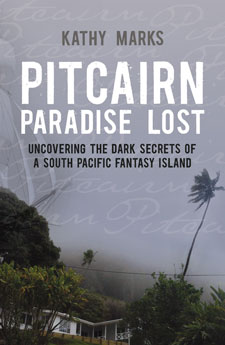Pitcairn island is the world’s most remote inhabited spot. (Although there are islands more physically remote, they possess superior communications.)
This tiny rock in the south east Pacific is also the world’s smallest territory. It is a closed community and not just because of its location but at the islanders’ wishes.
The isolation was at the heart of its settlement by the “HMS Bounty” mutineers and a group of Tahitians in 1790…. far from the long arm of the British Admiralty and away from the gaze of the outside world.
 Many films and books romanticised this fabled “idyllic paradise”, a remote and wild home to the descendants of the Bounty but also, as the world discovered recently, a place of sinister secrets.
Many films and books romanticised this fabled “idyllic paradise”, a remote and wild home to the descendants of the Bounty but also, as the world discovered recently, a place of sinister secrets.
As the book Pitcairn: Paradise Lost - Uncovering the dark secrets of a South Pacific fantasy paradise records, beginning in 2000, police descended on the British colony on Pitcairn to investigate disturbing reports of rape. It made news around the world.
What police discovered was a horrifying trail of child abuse dating back generations.
Many of the men were tainted by allegations and hardly a girl had escaped yet many residents feigned ignorance or claimed it was their “way of life”. The trials took over seven years and tore at the community fabric as Operation Unique began.
In a community of 47 the picture began to unravel as victims came forward. Some of the women who spoke out recanted, judging the repercussions too great. Others too old or too compromised stayed silent throughout. The dark side of Pitcairn emerged where, in a tiny community, individuality is subjugated to the common good, privacy is nil and small disputes can take on grand proportions.
Pitcarin's image as a peace-abiding community after ten years of murder and mayhem at the core of its establishment, where a few of the initial mutineers and the Tahitian women were left following murder, alcoholic binges and suicides was shown to be exactly that " an image. The islanders even have a word to describe this veneer: “hypocriting”.
Hypocriting describes a sea which looks calm but is in reality treacherous. Behaviour on board the passing ships where wooden carvings are sold is also called hypocriting. As one of the islanders put it they considered themselves above the law, convinced that “because they are Pitcairners ...they can get away with it". "It” apparently includes a sense of entitlement to British aid, to goods from the ships, government stores of timber, and sex with girls as young as seven. Other writers commented that it was a society dominated by a few Alpha males, where a strong individual can wield disproportionate power leading to aberrant behaviour becoming the norm.
Warnings and reports from teachers and pastors from years gone by were ignored. Many of them knew that there were issues. When a pastor was recently asked if he believed that the islanders were ever genuinely pious he replied, “I have my doubts. This is an island that the gospel changed, but I wonder whether Christianity really penetrated their daily lives. Or was it simply a convenient cloak of respectability to cover up what was going on behind?”
Kathy Marks, the journalist author, was one of six journalists who lived on the island during the trials and then followed the legal and human saga to its conclusion in 2007. She said it was the most riveting story she had covered and she read widely into the Pitcairn history/story so as to gain a greater insight into this fascinating but disturbing story.
The trials brought imprisonment on Pitcairn. The convicted men built the jail and work most days outside it, manning the longboat, building roads and improving infrastructure. They are due to be released this year.
All of the girls live away from Pitcairn and many, although glad that the matters had gone to court felt that the punishment was just like “a slap on the wrist” and that the offenders see nothing wrong in their behaviour, just an irritation with “outside interference” in island affairs.
They had been operating in a society where the majority of adult males felt they were untouchable. Once the trials began the men blamed everyone else. One outsider remarked “They remind me of a pampered child. But much more dangerous. Undoubtedly, at times there is a palpable evil here”. The trials have brought a new group of people to the island from “the outside” so that a third of the population now includes prison officers, social workers, a constable, doctor, teacher, pastor and governor’s representative. There is hope that with an influx of new people and better infrastrusture, and communications with the outside world (Britain has spent nearly $NZ50 million since 2000) that there will be a watershed for Pitcairn.
Marks comments: “Put 15 men, 12 women and a baby on a rock, leave them alone for 200 years, then take off the lid. We already know that the results were ugly. Pitcairn seems to confirm Golding’s dark vision in Lord of the Flies but this was no ficticious place but an island drawn together by a unique confluence of historical events” It's a cautionary story of shattered lives, codes broken and a community forced to examine itself.



















